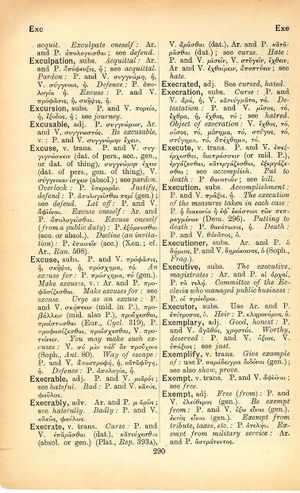excuse: Difference between revisions
πάτερ, ἄφες αὐτοῖς, οὐ γὰρ οἴδασιν τί ποιοῦσιν → father, forgive them, for they know not what they do
mNo edit summary |
m (Woodhouse1 replacement) |
||
| Line 1: | Line 1: | ||
{{Woodhouse1 | {{Woodhouse1 | ||
|Text=[[File:woodhouse_290.jpg|thumb|link={{filepath:woodhouse_290.jpg}}]] | |Text=[[File:woodhouse_290.jpg|thumb|link={{filepath:woodhouse_290.jpg}}]] | ||
===verb transitive=== | |||
[[prose|P.]] and [[verse|V.]] [[συγγιγνώσκειν]] (dat. of [[pers]]., acc., gen., or dat. of [[thing]]), [[συγγνώμην ἔχειν]] (dat. of [[pers]]., gen. of [[thing]]), [[verse|V.]] [[σύγγνοιαν ἴσχειν]] (absol.); see [[pardon]]. | |||
P. and V. [[πρόφασις]], ἡ, [[σκῆψις]], ἡ, [[πρόσχημα]], τό. | [[overlook]]: [[prose|P.]] [[ὑπερορᾶν]]. | ||
[[justify]], [[defend]]: [[prose|P.]] [[ἀπολογεῖσθαι περί]] (gen.); see [[defend]]. | |||
[[let off]]: [[prose|P.]] and [[verse|V.]] [[ἀφιέναι]]. [[excuseoneself]]: [[Aristophanes|Ar.]] and [[prose|P.]] [[ἀπολογεῖσθαι]]. | |||
[[excuse oneself]] ([[from a public duty]]): [[prose|P.]] [[ἐξόμνυσθαι]] (acc. or absol.). | |||
[[decline]] (an [[invitation]]): [[prose|P.]] [[ἐπαινέω]], [[ἐπαινεῖν]] (acc.) ([[Xenophon|Xen.]]; cf. [[Aristophanes|Ar.]], ''[[Ranae]]'' 508). | |||
===substantive=== | |||
[[prose|P.]] and [[verse|V.]] [[πρόφασις]], ἡ, [[σκῆψις]], ἡ, [[πρόσχημα]], τό. | |||
[[an excuse for]]: [[prose|P.]] [[πρόσχημα]], τό (gen.). | |||
[[make excuses]], v.: [[Aristophanes|Ar.]] and [[prose|P.]] [[προφασίζεσθαι]]. | |||
[[make excuses for]]: see [[excuse]]. | |||
[[urge as an excuse]]: [[prose|P.]] and [[verse|V.]] [[σκήπτειν]] (mid. in [[prose|P.]]), [[προβάλλειν]] (mid. also [[prose|P.]]), [[προὔχεσθαι]], [[προΐστασθαι]] ([[Euripides|Eur.]], ''[[Cyclops]]'' 319), [[prose|P.]] [[προφασίζεσθαι]], [[προΐσχεσθαι]], [[verse|V.]] [[προτείνειν]]. | |||
[[you may make such excuses]]: [[verse|V.]] [[σὺ μὲν τάδ' ἂν προὔχοιο]] ([[Sophocles|Soph.]], ''[[Antigone]]'' 80). | |||
[[way of escape]]: [[prose|P.]] and [[verse|V.]] [[ἀποστροφή]], ἡ, [[καταφυγή]]), ἡ. | |||
[[defence]]: [[prose|P.]] [[ἀπολογία]], ἡ. | |||
}} | }} | ||
Revision as of 08:50, 20 May 2020
English > Greek (Woodhouse)
verb transitive
P. and V. συγγιγνώσκειν (dat. of pers., acc., gen., or dat. of thing), συγγνώμην ἔχειν (dat. of pers., gen. of thing), V. σύγγνοιαν ἴσχειν (absol.); see pardon.
justify, defend: P. ἀπολογεῖσθαι περί (gen.); see defend.
let off: P. and V. ἀφιέναι. excuseoneself: Ar. and P. ἀπολογεῖσθαι.
excuse oneself (from a public duty): P. ἐξόμνυσθαι (acc. or absol.).
decline (an invitation): P. ἐπαινέω, ἐπαινεῖν (acc.) (Xen.; cf. Ar., Ranae 508).
substantive
P. and V. πρόφασις, ἡ, σκῆψις, ἡ, πρόσχημα, τό.
an excuse for: P. πρόσχημα, τό (gen.).
make excuses, v.: Ar. and P. προφασίζεσθαι.
make excuses for: see excuse.
urge as an excuse: P. and V. σκήπτειν (mid. in P.), προβάλλειν (mid. also P.), προὔχεσθαι, προΐστασθαι (Eur., Cyclops 319), P. προφασίζεσθαι, προΐσχεσθαι, V. προτείνειν.
you may make such excuses: V. σὺ μὲν τάδ' ἂν προὔχοιο (Soph., Antigone 80).
way of escape: P. and V. ἀποστροφή, ἡ, καταφυγή), ἡ.

